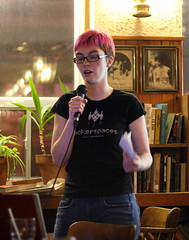
Tom Purves’ Protip #67 for social media marketing:
STEP 1: Make a product actually worth talking about.
STEP 2: See step 1.
STEP 3: There is no step 3.
Originally tweeted, reblogged here for posterity.


STEP 1: Make a product actually worth talking about.
STEP 2: See step 1.
STEP 3: There is no step 3.
Originally tweeted, reblogged here for posterity.
A friend asked me today for a two line bio of what’s been keeping me so busy these days. And the most accurate description in very general terms I came up with was this. Stopping to think about it, I thought it sounded pretty good. I’d hire me.
Thomas Purves is a Toronto based blogger, technologist and innovator. By day, Thomas helps global major brands plan for their digital futures and navigate the as-yet murky waters of mobile commerce.
Of course, by early morning and night, my other nearly full time job consists of hurling Frisbees for a particularly indefatigable furry four legged dingo.
If you’d like your future told, or like to toss a disc sometime, drop me a line.
[liveblogging as we go. here we go…]
DemoCamp19 5 min demos, because 5 minutes is long enough. DemoCamp is like open mic night for high tech. At the lovably seedy Imperial pub.
Austin Hill demoing Akoha, telling us about a card game that makes the world a better place. This app has come a long way, facebook like interface with friends, wall etc. You play cards that involve other people, like take someone for a drink, and then you pay it forward by giving them a card for them to push forward. There are leaderboards for cities, people and groups. You can even suggest or design missions. Apparently they are not supposed to be “dirty” (what’s wrong with dirty eh? wouldn’t that be half the fun?). But you can link your decks to a charity of your choice and help them raise money. You can see your karmic connection and the impact of your missions. they are building a school in nepal based on 25000 missions are completed.
Why not virtual/mobile cards? Cards are more common denominator. Is a tactile card more meaningful?
Revenue model? pay for cards, corp sponsors for decks (like a GE green deck) and premium services
Chris, backtype Shows you all the conversations about a url. Aggregates and crawls comments and commentary around the world. Now demoing backtweets it will tell you all the twitter activity relative to a post, or a story like a NY times story, even if the urls are shortened. Also cool is back alerts that lets you subscribe to a search. All built on AWS (amazon web services) so it scales. They are making money through a commercial API, but at the moment not a huge priority. Most of the app was built over the summer, buy these two pretty young guys. And it’s pretty sweet piece of technology is the general consensus.
Scott is showing Dex is a personal CRM/contact manager that aggregates all the folks you know (and you get to say how important each friend is) and it crawls the social web to keep track of what their up to. So the idea is when you move from company to company in your career you can take your personal CRM with you rather than leave it with someone else. Track leads and deals etc. Gives you a kind of personal metrics / business card that you can point to that says the size/value of your book your history deals.
Matthew from Foodea At first glace, Foodea is classic democamp demo, here’s a vertical special interest social media rails site I made in my pajamas. Essentially a social recipe site with the ability comment, edit, upload photo/video etc and the ability to export ingredients to a shopping list (not a bad idea). All ingredients also hyperlinked to the “pantry” area of site where they have a wikipedia like section dedicated to food ingredients.
Oooh ImageSpark is a T&L. They couldn’t get a ffffound invite, so they invented their own alternative. For images and designs that inspire your work. I am so wanting this. You can also create a “mood board” related to, for example “all things helvetica”. Great firefox plugin to just right click anything on the web and send it to impagespark. This is one of my faves. I’d like to work in a place that used this.
[pizza break!]
Albert who is a grand daddy of democamp is presenting kontagent a viral analytics tool for facebook. Focused on game developers. There are game developers out there, secret developers, recent Waterloo dropouts, making seven figures on facebook games. You can filter by age, gender, geography. You can measure k-factor which is your viral coefficient, you can track your acceptance rates by invites and invite channels to rapidly do AB testing. “It’s amazing who subtle changes in your applications can massively changing the virality of your applicationâ€. Very sophisticated, compare cohorts against virality, engagement and churn.
 Leigh Honeywell – presenting the awesomeness of Hacklab.to Open tuesdays, python thursdays. It’s cheap! $50 a month for unlimited hacking. I have visited this hacklab. I approve.
Leigh Honeywell – presenting the awesomeness of Hacklab.to Open tuesdays, python thursdays. It’s cheap! $50 a month for unlimited hacking. I have visited this hacklab. I approve.
N8RTXT is a location aware haiku service that texts you haikus about where ever you are. Tailored to place and season and covering almost all of Canada, uses plant and animal databases, urban mapping and urban/rural distinguishment. In the backgroud it downloads a google satelite image and does a color analysis to determine what sort of environment you are in. And time of day, because for example racoons are tagged with “nighttime”. The phone number is 416 662 3408 text a postal code or “queen and ossington, toronto”.
And now the poor battery is fading. Too close for missiles, switching to beer…